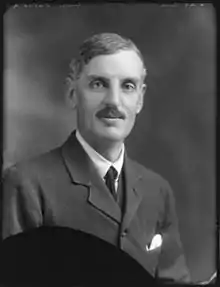Robert Hamilton (Liberal politician)
Sir Robert William Hamilton (26 August 1867 – 5 July 1944) was a Scottish Liberal Party politician and Chief Justice of the East Africa Protectorate.

Background
Hamilton was the second son of Sir Robert G. C. Hamilton who was Governor of Tasmania. He was educated at St Paul's School and Trinity Hall, Cambridge. He was knighted in 1918. In 1925 he married Gertrude Williamson of Kirkwall, Orkney.[1]
Professional career
In 1905 Hamilton was appointed Principal Judge and Chief Justice of the East Africa Protectorate. He was appointed as Chairman of the Civil Service Commission in 1918. He retired from the civil service in 1920.[2]
Political career
Hamilton was selected as Liberal candidate for the island constituency of Orkney and Shetland at the 1922 general election. The seat was a safe Liberal seat, where at the previous election Sir Malcolm Smith had been returned unopposed. Smith declared himself a supporter of Lloyd George's Coalition Government and sought re-election in 1922 as a National Liberal Party candidate. The two Liberal factions went head to head and Hamilton won the seat;
| Party | Candidate | Votes | % | ±% | |
|---|---|---|---|---|---|
| Liberal | Robert Hamilton | 4,814 | 53.5 | n/a | |
| National Liberal | Malcolm Smith | 4,189 | 46.5 | n/a | |
| Majority | 625 | 7.0 | n/a | ||
| Turnout | 9,003 | 37.4 | n/a | ||
| Liberal gain from National Liberal | Swing | n/a | |||
He was re-elected at the general election a year later, this time against a Unionist challenger;
| Party | Candidate | Votes | % | ±% | |
|---|---|---|---|---|---|
| Liberal | Robert Hamilton | 5,129 | 54.3 | +0.8 | |
| Unionist | Robert Boothby | 4,318 | 45.7 | n/a | |
| Majority | 811 | 8.6 | +1.6 | ||
| Turnout | 9,447 | 39.1 | +1.7 | ||
| Liberal hold | Swing | ||||
In 1924 he was returned at the general election unopposed. At the 1929 General election he was re-elected with a bigger majority;
| Party | Candidate | Votes | % | ±% | |
|---|---|---|---|---|---|
| Liberal | Robert Hamilton | 8,256 | 60.4 | n/a | |
| Unionist | Basil Neven-Spence | 5,404 | 39.6 | n/a | |
| Majority | 2,852 | 20.6 | n/a | ||
| Turnout | 13,660 | 43.1 | n/a | ||
| Liberal hold | Swing | n/a | |||
He served as a Parliamentary delegate to South Africa in 1924, to Canada in 1928 and to Iceland in 1930. From 1930 to 1931 he was a member of the first Round Table Conference formed to discuss plans for Indian independence.[3] In 1931 he served on the Joint Select committee on East Africa.[4] When the Liberal Party split in late 1931, Hamilton followed the group led by Sir Herbert Samuel and the official Liberal Party, in support of the National Government. He became Parliamentary Under-Secretary of State for the Colonies in the National Government in September 1931, working under the Conservative Philip Cunliffe-Lister. At the October general election he was returned unopposed. In 1932 he was replaced as Under-Secretary by the Conservative Ivor Windsor-Clive, 2nd Earl of Plymouth. When the Liberal Party decided to leave the National Government in 1933, he followed Samuel across to the opposition benches. He was appointed Scottish Liberal Whip in 1934. He lost his seat at the 1935 general election, to the Conservative Party candidate.
| Party | Candidate | Votes | % | ±% | |
|---|---|---|---|---|---|
| Unionist | Basil Neven-Spence | 8,406 | 57.6 | n/a | |
| Liberal | Robert Hamilton | 6,180 | 42.4 | n/a | |
| Majority | 2,226 | 15.2 | n/a | ||
| Turnout | 1,586 | 46.3 | n/a | ||
| Unionist gain from Liberal | Swing | n/a | |||
He retired from politics and did not stand again.
References
- ‘HAMILTON, Sir Robert William’, Who Was Who, A & C Black, an imprint of Bloomsbury Publishing plc, 1920–2015; online edn, Oxford University Press, 2014 ; online edn, April 2014 accessed 17 June 2015
- The Times House of Commons, 1935
- ‘HAMILTON, Sir Robert William’, Who Was Who, A & C Black, an imprint of Bloomsbury Publishing plc, 1920–2015; online edn, Oxford University Press, 2014 ; online edn, April 2014 accessed 17 June 2015
- The Times House of Commons, 1935
External links
- Hansard 1803–2005: contributions in Parliament by Sir Robert Hamilton
| Parliament of the United Kingdom | ||
|---|---|---|
| Preceded by Sir Malcolm Smith |
Member of Parliament for Orkney and Shetland 1922–1935 |
Succeeded by Sir Basil Neven-Spence |
| Political offices | ||
| Preceded by Drummond Shiels |
Under-Secretary of State for the Colonies 1931–1932 |
Succeeded by The Earl of Plymouth |